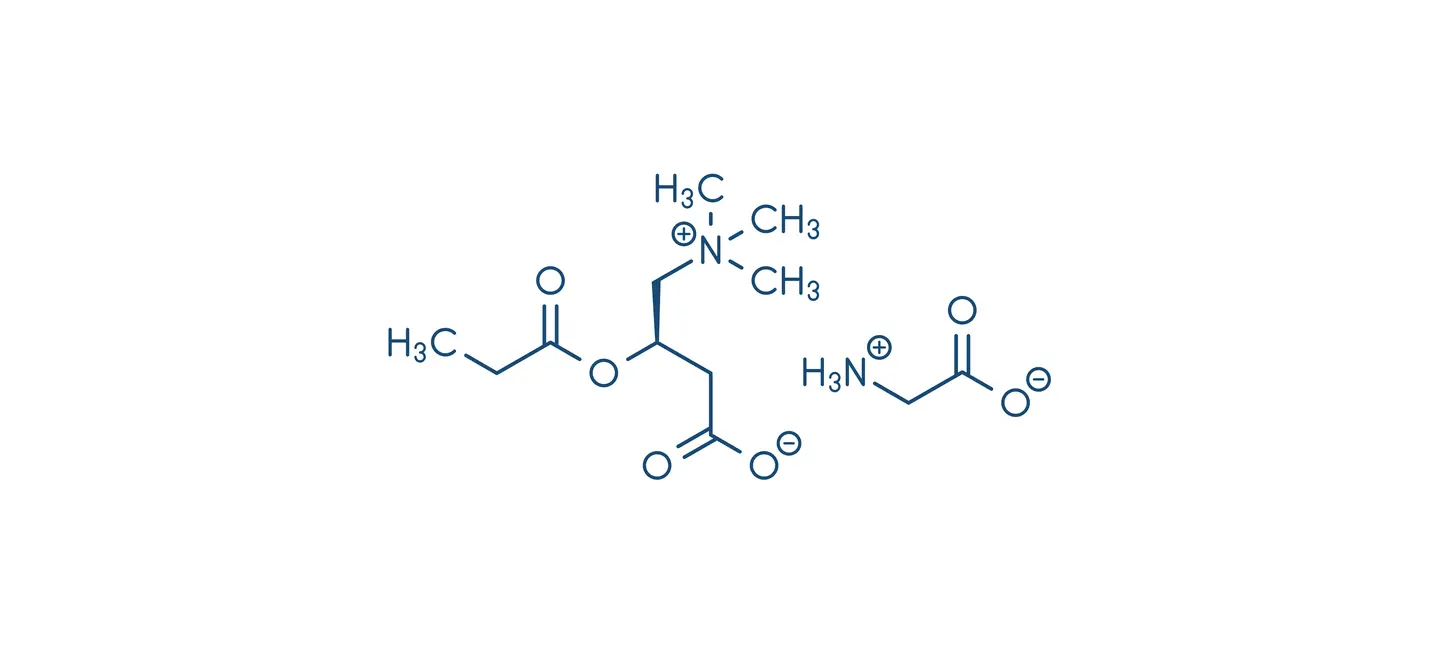
Propionyl-L-carnitine is a chemical naturally made in the body. It’s related to two other compounds called L-carnitine and acetyl-L-carnitine.
Propionyl-L-carnitine helps the body produce energy. It’s important for heart function, muscle movement, and many other body processes. It also seems to help increase circulation.
People use propionyl-L-carnitine for chest pain, heart disease, heart failure, athletic performance, chronic fatigue, and many other conditions, but there is no good scientific evidence to support many of these uses.
Don't confuse propionyl-L-carnitine with acetyl-L-carnitine or L-carnitine. These are not the same.
Is It Effective?
NatMed Pro rates effectiveness based on scientific evidence according to the following scale: Effective, Likely Effective, Possibly Effective, Possibly Ineffective, Likely Ineffective, Ineffective, and Insufficient Evidence to Rate.
- Chest pain (angina). Taking propionyl-L-carnitine by mouth seems to help people with chest pain walk farther. It might also reduce how often some people feel chest pain.
- Heart disease. Taking propionyl-L-carnitine by IV helps the heart to pump better in people with heart disease. IV products can only be given by a healthcare provider.
- Heart failure and fluid build up in the body (congestive heart failure or CHF). Taking propionyl-L-carnitine by mouth seems to improve how the heart works in people with mild or moderate CHF. It also seems to help people with CHF walk farther.
- Leg pain during exercise due to poor blood flow (intermittent claudication). Taking propionyl-L-carnitine by mouth or by IV seems to help people with leg pain walk farther and also improve quality of life. IV products can only be given by a healthcare provider.
- A type of inflammatory bowel disease (ulcerative colitis). Taking propionyl-L-carnitine with other medications by mouth might help to reduce symptoms in people with ulcerative colitis.
There is interest in using propionyl-L-carnitine for a number of other purposes, but there isn’t enough reliable information to say whether it might be helpful.
Is it Safe?
When taken by mouth: Propionyl-L-carnitine is likely safe when taken in doses up to 3 grams daily for up to 6 months. It can cause stomach upset, vomiting, diarrhea, and other side effects.
Special Precautions & Warnings:
Pregnancy and breast-feeding: There isn't enough reliable information to know if propionyl-L-carnitine is safe to use when pregnant or breast-feeding. Stay on the safe side and avoid use.
Underactive thyroid (hypothyroidism): Propionyl-L-carnitine might make hypothyroidism worse or thyroid hormone treatment less effective. If you have hypothyroidism, don't take propionyl-L-carnitine.
Seizures: Some people who have a history of seizures have reported an increase in seizures after taking L-carnitine. Propionyl-L-carnitine is similar to L-carnitine and might have some of the same effects. Don’t take it if you have seizures.
Acenocoumarol (Sintrom)
Interaction Rating=Moderate Be cautious with this combination.
Acenocoumarol is used to slow blood clotting. Propionyl-L-carnitine might increase the effects of acenocoumarol, which might increase the chances of bruising and bleeding. The dose of your acenocoumarol might need to be changed.
Thyroid hormone
Interaction Rating=Moderate Be cautious with this combination.
Propionyl-L-carnitine might decrease how well thyroid hormone works in the body. Taking propionyl-L-carnitine with thyroid hormone might decrease the effects of thyroid hormones.
Warfarin (Coumadin)
Interaction Rating=Moderate Be cautious with this combination.
Warfarin is used to slow blood clotting. Propionyl-L-carnitine might increase the effects of warfarin and increase the chances of bruising and bleeding. Be sure to have your blood checked regularly. The dose of your warfarin might need to be changed.
D-carnitine: D-carnitine might interfere with the way the body processes L-carnitine, which is a "parent" chemical for propionyl-L-carnitine. Taking D-carnitine might cause propionyl-L-carnitine levels to drop too low.
There are no known interactions with foods.
Propionyl-L-carnitine has most often been used by adults in doses of 1.5-2 grams by mouth daily for up to 6 months. Speak with a healthcare provider to find out what dose might be best for a specific condition.
3-propanoyloxy-4-(trimethylazaniumyl) butanoate, 3-(1oxo-propoxy)-4-trimethyl ammonium chloride) Butanoic Acid, Glycine Propionyl-L-Carnitine, Glycine Propionyl-L-Carnitine HCl, Glycine Propionyl-L-Carnitine Hydrochloride, L-carnitine Propionyl, LPC, PLC, Propionil-L-Carnitina, Propionyl-L-Carnitine Hydrochloride, Propionylcarnitine.
Information on this website is for informational use only and is not intended to replace professional medical advice, diagnosis, or treatment. While evidence-based, it is not guaranteed to be error-free and is not intended to meet any particular user’s needs or requirements or to cover all possible uses, safety concerns, interactions, outcomes, or adverse effects. Always check with your doctor or other medical professional before making healthcare decisions (including taking any medication) and do not delay or disregard seeking medical advice or treatment based on any information displayed on this website.
© TRC Healthcare 2024. All rights reserved. Use and/or distribution is permitted only pursuant to a valid license or other permission from TRC Healthcare.
